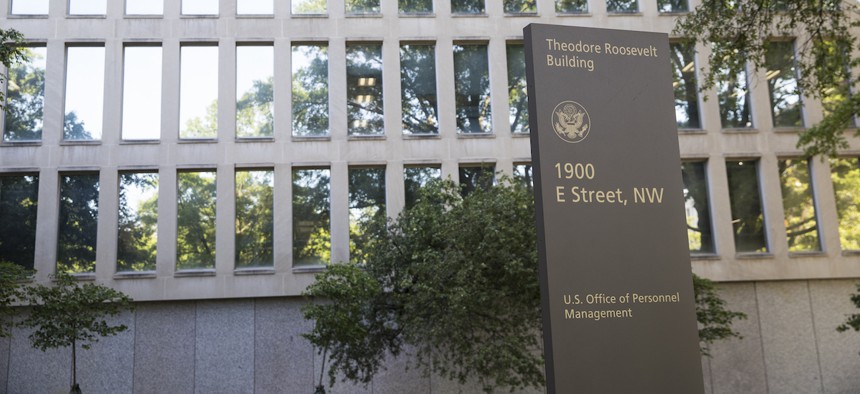
The practice by which employers solicit the salary histories of job applicants in order to determine how much to pay them has been cited as a way that historic pay disparities across ethnic and gender lines are perpetuated. Sarah Silbiger for The Washington Post via Getty Images
Ditch Salary History When Setting Job Applicants’ Pay, OPM Proposes
Aimed at reducing gender- and ethnicity-based pay gaps, the initiative would also apply tighter guard rails in cases when an applicant has a competing and higher-paying job offer.
The Office of Personnel Management on Wednesday proposed regulations that would ban federal agencies from using salary history to set the pay of federal job applicants in most cases, following through on the provisions of a 2021 executive order aimed at improving the federal government’s diversity, equity, inclusion and accessibility.
In June 2021, President Biden signed an executive order aimed at improving diversity within the federal workforce, requiring agencies to submit a plan to improve their diversity initiatives and tasking OPM with ensuring federal benefits programs are responsive to LGBTQ+ employees’ needs. The edict also asked the OPM director to consider whether to ban agencies from requesting job applicants’ salary histories during the hiring process.
The practice by which employers solicit the salary histories of job applicants in order to determine how much to pay them has been cited as a way that historic pay disparities across ethnic and gender lines are perpetuated. In the year since OPM announced it was in the process of drafting regulations to “address” the use of salary history in the federal hiring process, some federal employee groups have urged the agency not to preserve potential loopholes, such as allowing job applicants to submit their salary histories on a voluntary basis, that could allow the practice effectively to continue for applicants who have benefited from historic pay disparities.
In regulations set to be published in the Federal Register Thursday, OPM proposed banning the use of salary history in the vast majority of federal hiring actions within the General Schedule, Federal Wage System, as well as for administrative law judges and administrative appeals judges.
“Current OPM regulations . . . specifically allow agencies to request an applicant’s salary history and apply it as a factor in setting initial pay in certain situations after determining that the candidate has superior qualifications or the agency has a special need for the candidate’s services,” OPM wrote. “These proposed regulations change that policy—under these regulations, agencies may not consider an applicant’s salary when setting pay for newly appointed federal employees in certain pay systems.”
In the General Schedule, the only way agencies can consider salary history is if a job applicant has a competing job offer. And even in that instance, the federal agency must better document the need to boost an applicants’ salary offer, as well as consider additional equity factors before reaching its decision. Similar restrictions have been proposed to tailor the policy to the other job classifications included in the regulations.
“The regulations would continue to allow an agency to consider the salary in a competing job offer,” OPM wrote. “The competing job offer could be based on salaries for the skills and competencies required in the position to be filled. However, the regulations would require an agency to consider at least one other factor . . . (in addition to how pay has been set for other employees) if the agency is considering a competing job offer when setting pay under this authority. A determination based on more than one factor provides a stronger justification and mitigates any potential pay inequity from considering a competing job offer that may have been based on the candidate’s salary history.”
OPM said it was not proposing any changes to pay-setting policies for positions senior level, scientific or professional, or Senior Executive Service positions, in part because the gender pay gap within each job classification is less than 1%.
OPM also proposed requiring agencies to develop new policies governing when they offer former federal employees the so-called “maximum payable rate” based on their previous highest salary within government to ensure it is not overly reliant on a salary negotiated using an applicant’s salary history.
“OPM proposes . . . that an agency must establish a policy regarding use of the GS maximum payable rate rule that includes elements specified in the regulations, such as considering how pay has been set for employees performing similar work in the organization (based on the position’s occupational series, grade level, types of duties, or other job-relevant factors),” the agency wrote. “Requiring agencies to have a policy regarding their use of this discretionary pay authority will provide transparency and support consistent use among employees. The policy would be used to clarify if the agency uses the rule, in what situations, and how the agency will set pay in those situations.”
OPM is soliciting comments on its proposal between now and June 10. In a statement, OPM Director Kiran Ahuja said the proposed regulations would further the Biden administration’s goal of making the federal government a model employer.
“These proposed regulations are a major step forward that will help make the federal government a national leader in pay equity,” she said. “Relying on a candidate’s previous salary history can exacerbate preexisting inequality and disproportionally impact women and workers of color. With these proposed regulations, the Biden-Harris administration is setting the standard and demonstrating to the nation that we mean business when it comes to equality, fairness, and attracting the best talent.”







